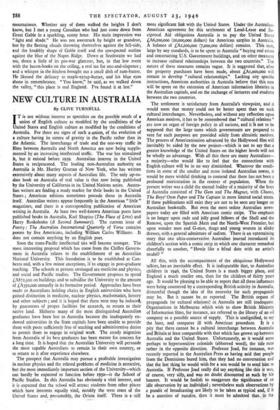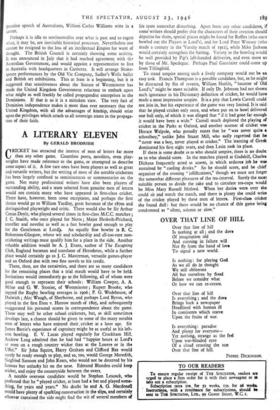NEW CULTURE IN AUSTRALIA
By CLIVE TURNBULL
T is not without interest to speculate on the possible result of a I union of English culture as modified by the conditions of the United States and English culture as modified by the conditions of Australia. For there are signs of such a mnion, of the evolution of a culture having its centre of gravity in the Pacific rather than in the Atlantic. The interchange of trade and the one-way traffic in films between Australia and North America are now being supple- mentea by an increasing intellectual traffic. The war has stimulated ft, but it existed before 1939. Australian interest in the United States is reciprocated. The leading non-Australian authority on Australia is Mr. Hartley Grattan of New York, who has written extensively about many aspects of Australian life. The only up-to- date book on Australia of real value is that now being published by the University of California in its United Nations series. Austra- lian writers are finding a ready market for their books in the United States ; American editions sometimes precede those in Australia itself. Australian writers appear frequently in the American " little " magazines, and there is a corresponding publication of American writing in Australia. At least two well-known American poets have published books in Australia, Karl Shapiro (The Place of Love) and Harry Roskolenko (A Second Summary). The current issue of Poetry : The Australian International Quarterly of Verse contains poems by five Americans, including William Carlos Williams. It does not contain anything by an English poet.
Soon the trans-Pacific intellectual ties will become stronger. The most interesting proposal which has come from the Chifley Govern- ment in Australia relates to the establishment of an Australian National University. This foundation is to be established at Can- berra and, with a few minor exceptions, is to engage in post-graduate teaching. The schools at present envisaged are medicine and physics, and social and Pacific studies. The Government proposes to spend kA872,5oo on buildings and to subsidise the University to the amount of £A35o,o0o annually in its formative period. Approaches have been made to Australians holding chairs in English universities who have gained distinction in medicine, nuclear physics, mathematics, history and other subjects ; and it is hoped that these men may be induced, by guarantees of proper facilities for research, to return to their native land. Hitherto many of the most distinguished Australian graduates have been lost to Australia because the inadequately en- dowed universities in the State capitals have been unable to provide them with posts sufficiently free of teaching and administrative duties to permit them to engage in original work. The steady migration from Australia of its best graduates has been matter for concern for a long time. It is hoped that the Australian University will persuade the most capable Australians to remain in their own country, or to return to it after experience elsewhere.
The prospect that Australia may pursue a profitable investigation in nuclear physics and the related problems of medicine is attractive, but the most immediately important section of the University—which can hardly be expected to function before 1950—is the School of Pacific Studies. In this Australia has obviously a vital interest, and it is expected that the school will attract students from other places which have interests equally vital, notably the west coast of the United States and, presumably, the Orient itself. There is a still more significant link with the United States. Under the Australian- American agreement for this settlement of Lend-Lease and Re- ciprocal Aid obligations Australia is to pay the United States LA6,zoo,000 (zo,000,000 dollars) for American surplus in Australia. A balance of £A2,2oo,000 (7,000,000 dollars) remains. This sum, large by any standards, is to be spent in Australia " buying real estate and constructing U.S. Government buildings, and on other measures to increase cultural relationships between the two countries." The nature of these measures remains vague. It is suggested that, after the property purchases have been made, about LAr,000,000 will remain to develop " cultural relationships:" Lacking any specific instructions, American authorities in Australia believe that this sum will be spent on the extension of American information libraries in the Australian capitals, and on the exchange of lecturers and students between the two countries.
The settlement is satisfactory from Australia's viewpoint, and it would seem that money could not be better spent than on such cultural interchanges. Nevertheless, and without any reflection upon American motives, it has to be remembered that "cultural relations" are now an organ of foreign policy in all nations, and it is not to be supposed that the large sums which governments are prepared to vote for such purposes are provided solely from altruistic motives: The process of Americanisation advanced by the Hollywood film will inevitably be aided by the new project—which is not to say that a greater knowledge of the United States on the higher levels will not be wholly an advantage. With all this there are many Australians— a majority—who would like to feel that the connections with English culture will be in no way diminished. Whatever the condi- tions in some of the smaller and more isolated Australian towns, it would be mere wishful thinking to contend that there has not been a profound reorientation in the centres of population. When the present writer was a child the mental fodder of a majority of the boys of Australia consisted of The Gem and The Magnet, with Chums, The Boys' Own Paper and The Captain in more limited social strata. If these publications still exist they are not to be seen any longer on Australian bookstalls. But even the most sedate Australian news- papers today are filled with American comic strips. The emphasis is no longer upon cads and jolly good fellows of the Shell and the Remove, upon the Spanish Main and the North-West Frontier, but upon wonder men and G-men, thugs and young women in slinky dresses, with a general admixture of sadism. There is an-entertaining story that one ultra-conservative Australian journal introduced its children's section with a comic strip in which one character remarked cheerfully to another, " Howja like a blind date with an artist's model? "
All this, with the accompaniment of the ubiquitous Hollywood talkies, has an inevitable effect. It is indisputable that, to Australian children in 1946, the United States is a much bigger place, and England a much smaller one, than for the children of thirty years ago. It would be pleasing to be able to report that all these influences were being countered by a corresponding British activity in Australia, distasteful though the idea of the necessity for such propaganda may be. But it cannot be so reported. The British organs of propaganda (or cultural relations) in Australia are still inadequate. Organisations in Melbourne which wish to show British Ministry of Information films, for instance, are referred to the library of an oil company as a possible source of supply. This is undignified, to say the least, and compares ill with American procedure. It is a pity that there cannot be a cultural interchange between Australia and Britain at least comparable with that which has grown up between Australia and the United States. Unfortunately, so it would seem perhaps to hypersensitive colonials (abhorred word), the tide runs rather in the opposite direction. Professor Joad, for instance, was recently reported in the Australian Press as having said that people from the Dominions bored him, that they had no conversation and that the last thing he would wish for a son would be to send him to Australia. If Professor Joad really did say anything like this it was, of course, very silly, and was no doubt discounted as such by his hearers. It would be foolish to exaggerate the significance of an idle observation by an individual ; nevertheless such observations by a pundit of broadcasting are likely to be taken as typical and, if it be a question of pundits, then it must be admitted that.- in the
putative speech of Australians, William Carlos Williams wins in a canter.
Perhaps it is idle to sentimentalise over what is past and to regret what, it may be, are inevitable historical processes. Nevertheless one cannot be resigned to the loss of an intellectual Empire for want of thought. The British Council is certainly showing some activity. It was announced in July that it had reached agreement with tli.t Australian Government, and would appoint a representative to live in Australia with headquarters in Canberra. It will arrange Shake- speare performances by the Old Vic Company, Sadler's Wells ballet and British art exhibitions. This at least is a beginning, but it is suggested that sensitiveness about the Statute of Westminster has made the United Kingdom Government reluctant to embark upon what might as well frankly be called propagandist enterprises in the Dominions. If that is so it is a mistaken view. The very fact of Dominion independence makes it more than ever necessary that the United Kingdom, with all the advantages of kinship, should seize upon the privileges which attach to all sovereign states in the propaga- tion of their faith.



























 Previous page
Previous page